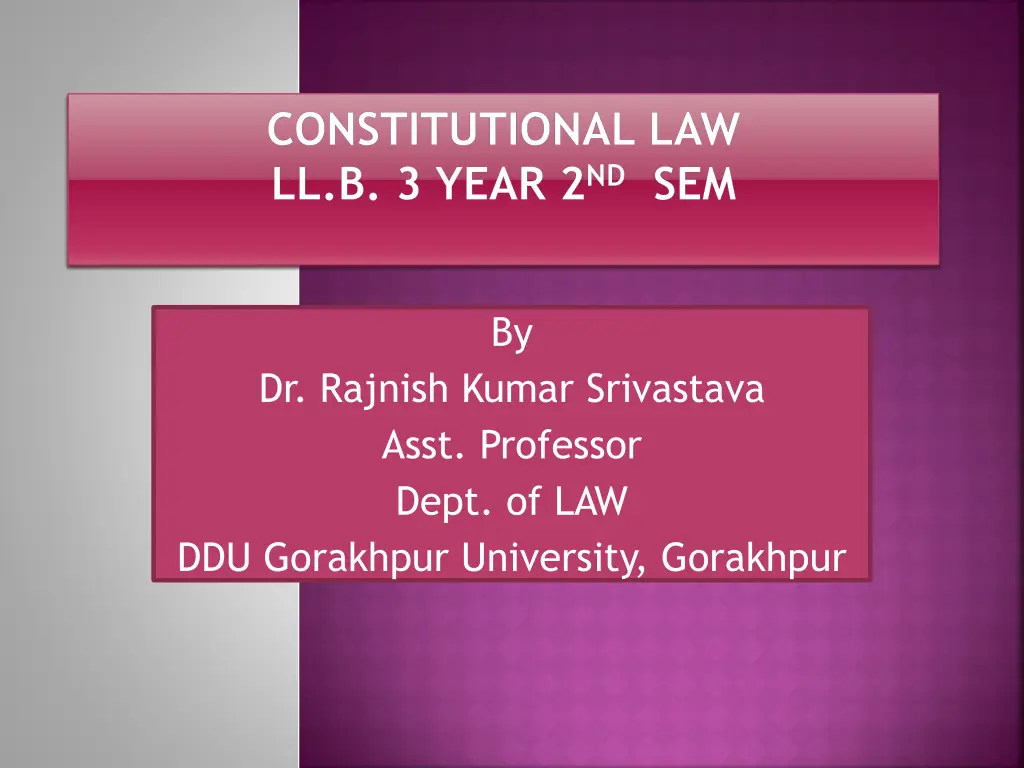
Constitutional Law LL.B. 3 Year 2nd Semester Overview
Explore the intricacies of Constitutional Law LL.B. 3 Year 2nd Semester as covered by Dr. Rajnish Kumar Srivastava, Assistant Professor at DDU Gorakhpur University. This summary delves into Article 15(4), special provisions for backward classes, Scheduled Castes and Scheduled Tribes, and relevant court cases like Gulshan Prakash v. State of Haryana. Gain insights into the nuances of socially and educationally backward classes, along with the key issues surrounding Article 15(4).
Download Presentation

Please find below an Image/Link to download the presentation.
The content on the website is provided AS IS for your information and personal use only. It may not be sold, licensed, or shared on other websites without obtaining consent from the author. If you encounter any issues during the download, it is possible that the publisher has removed the file from their server.
You are allowed to download the files provided on this website for personal or commercial use, subject to the condition that they are used lawfully. All files are the property of their respective owners.
The content on the website is provided AS IS for your information and personal use only. It may not be sold, licensed, or shared on other websites without obtaining consent from the author.
E N D
Presentation Transcript
CONSTITUTIONAL LAW LL.B. 3 YEAR 2NDSEM By Dr. Rajnish Kumar Srivastava Asst. Professor Dept. of LAW DDU Gorakhpur University, Gorakhpur
SPECIAL PROVISION FOR BACKWARD CLASSES {ARTICLE 15(4)} Article 15(4) provides, nothing in this article or in clause (2) of article 29 shall prevent the State from making any special provision advancement of educationally backward citizens or for the Scheduled Castes and the Scheduled Tribes. for the and of any socially classes
ARTICLE 15(4) CONTAINS ANOTHER EXCEPTION OF ARTICLE 15(1) AND (2) This Constitution Act,1951, as a sequel to the decision of seven-Judge Bench of Supreme Court in State Champakam Dorairajan AIR 1951 SC 226 clause was (First added by the Amendment) of Madras v.
BACKWARD CLASSES The expression backward classes is not defined in the constitution. Article 340 of however, empowers the President to appoint a Commission to investigate the conditions educationally backward within the territory of India. On receiving the commission the specify the classes to be considered backward. the constitution of socially and classes Report President of the may
SCHEDULED CASTES AND SCHEDULED TRIBES The expression Scheduled Castes and Scheduled Tribes have been defined under Clauses (24) and (25), respectively of article 366. article 366 is to be read with Article 341 and 342 for this purpose
GULSHAN PRAKASH V. STATE OF HARYANA AIR 2010 S.C. 288 Article 15(4) is only an enabling provision. Article exception but only make a special application of the reasonable classification. 15 is not an principle of
ACCORDING TO ARTICLE 15(4) THE TWO ISSUES HAVE ARISEN BEFORE THE COURTS 1- what shall be the basis to determine a class to be socially and educationally backward, and 2- what can be the extent or quantum of the special provision authorised by this Clause.
M.R. BALAJI V. STATE OF MYSORE AIR 1963 SC 649 The backwardness under clause (4) of article 15 must be both, educationally. Supreme Court held that socially and
P. RAJENDRAN V. STATE OF MADRAS AIR 1968 SC 1012 In this case the Supreme Court upheld the test of backwardness which was solely based on caste.
INDRA SAWHNEY V. UNION OF INDIA AIR 1993 S.C.477 This Commission Case. In this case the matter seems to have been settled by the majority of the Supreme Court, holding that caste important or even sole factor in determining the social backwardness and that poverty alone cannot be such a criterion. case is known as Mandal can be an
NATIONAL LEGAL SERVICES AUTHORITY V. UNION OF INDIAAIR 2014 S.C. 1863 The division bench of the court strongly advised the Government to gradually discard the caste- centric definition of backward and evolve new methods and discover and address emerging forms of backwardness. practices, yardsticks to
M.R. BALAJI V. STATE OF MYSORE AIR 1963 SC 649 The special weaker sections of the society must not exceed 50 per cent limit. It has been held that the principle of fixing the percentage of reservation emanates from the doctrine of reasonableness. Supreme provision Court laid reservation down that for or
INDRA SAWHNEY V. UNION OF INDIA AIR 1993 S.C.477 In this case the Supreme Court finally held that barring situations, reservation should not exceed 50 per cent. any extraordinary
ARTICLE 15(5) The Constitution 93rdAmendment Act, 2005 has inserted a new clause (5) in article 15. The new clause enables the State to make by law, special provision, for the advancement of any socially and educationally backward classes of citizens or for the Scheduled Scheduled Tribes. Castes or the
IMPORTANT CASE LAWS 1- T.M.A. Pai Foundation v. State of Karnataka AIR 2003 S.C. 355 2- Islamic Academy of Education v. State of Karnataka AIR 2003 S.C. 3724 3- P.A. Inamdar v. State of Maharashtra AIR 2005 S.C. 3226
PROVISION OF ARTICLE 15(5) RELATES TO- Admission in to educational institution including private educational institution whether aided or unaided by the State, other than the minority institutions under Article 30(1) of the Constitution. educational
ASHOK KUMAR THAKUR V. UNION OF INDIA AIR 2008 S.C. 1 A Constitutional Bench of the Apex Court has upheld the validity of the 93rd Amendment Act,2005
103RD CONSTITUTION AMENDMENT ACT, 2019 There has been an amendment in Article 15. By the virtue of this Act, Clause (6) is added in Article 15. Article 15(6) caters reservation to the economically weaker section of the upper caste and the special provisions relate to their admission to educational institutions including private educational institutions, whether aided or unaided by the State, other than the minority educational institutions referred to in clause (1) of Article 30. This respective Amendment aims to provide reservation to those who do not fall in Articles 15(5) and 15(4) (effectively Scheduled Tribes and Other Backward Classes). Scheduled Castes,
